(Uma Naidoo) In my work as a nutritional psychiatrist, I support people with a variety of neurological and psychiatric concerns, ranging from pervasive conditions like depression and anxiety to day-to-day issues such as poor sleep, difficulty focusing, and, you guessed it — brain fog. While brain fog can be a symptom of many different diseases and syndromes, it can also be a result of foods in our diet that affect our blood sugar levels, oxygen supply to the brain, or inflammation anywhere along the process of thought and mood formation.
Related Joe Biden Creeps on Little Girls During Rehoboth Beach Stroll (VIDEO)
Source – Food Revolution Network
by Uma Naidoo, June 8th, 2022
What Is Brain Fog?
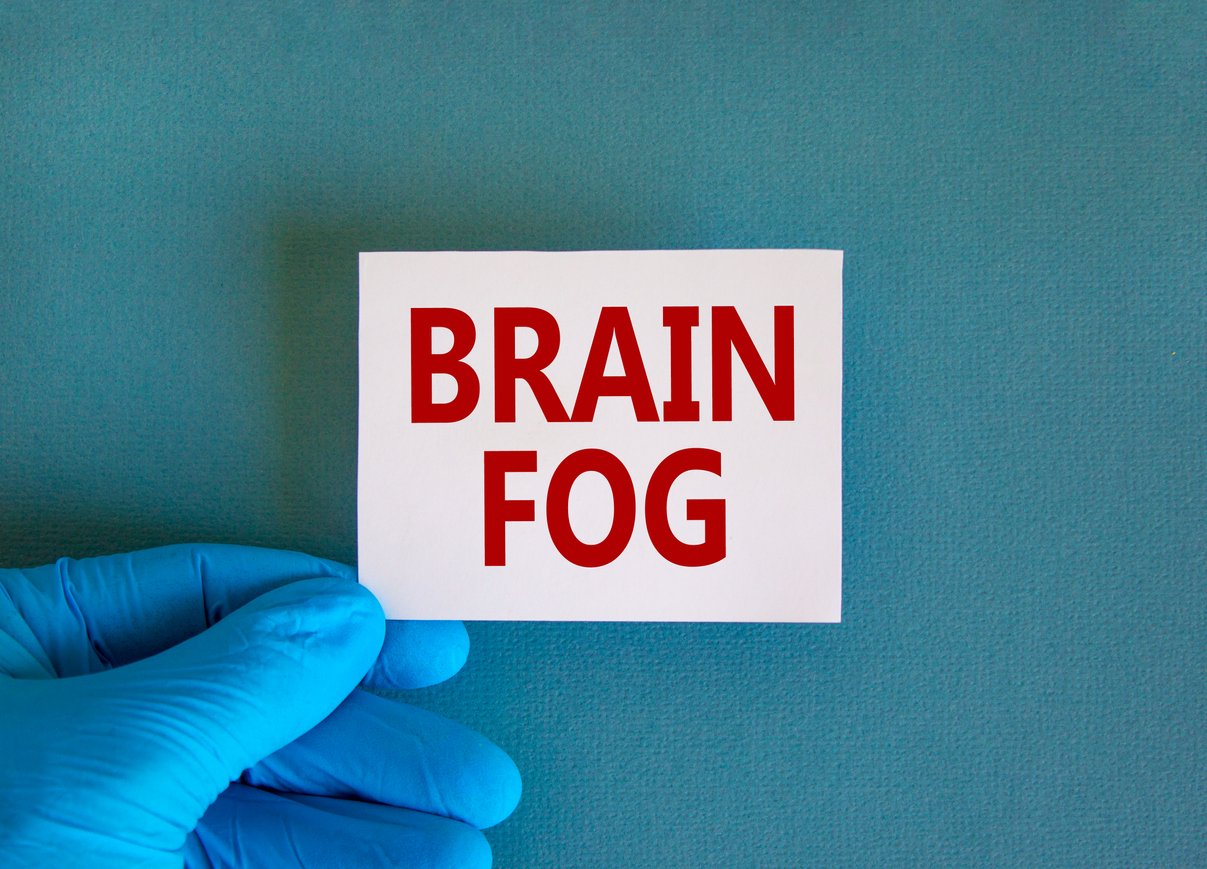
What Causes Brain Fog?
The causes of brain fog can range from fairly benign to quite serious. On the dangerous end of the spectrum, it can be a symptom of serious conditions, like hypoglycemia, nutrient deficiencies, impaired blood glucose control, viral infections, or even stroke. If you find yourself with a sudden onset of brain fog, especially alongside symptoms of dizziness, a sudden fall, or weakness in your limbs/drooping of your face, please seek emergency medical care immediately.
Other causes of brain fog can include chronic conditions like fibromyalgia or chronic fatigue syndrome, or a transient response to food or environmental triggers. These include a “crash” after ingesting high amounts of sugar or caffeine, or as part of the symptoms reflecting an underlying food intolerance. Of note, long COVID syndrome is now also being associated with brain fog.
What Does Brain Fog Feel Like?
While there is no clinical diagnosis for brain fog, it is reported that symptoms of brain fog may include:
- slow thinking
- difficulty focusing
- confusion
- lack of concentration
- forgetfulness
- haziness in thought processes
Other than the cognitive symptoms, brain fog generally doesn’t feel like much — perhaps it may be associated with a headache, in the case of a hangover, but if any other physical symptoms present alongside it, this is also a reason to seek medical care.
Why Brain Fog Is Harmful

Short-Term Consequences of Brain Fog
In an immediate sense, the most pressing consequences of brain fog may be slowed productivity, thinking, or decision-making, which may negatively impact your ability to complete work or tasks at home. If your work involves operating heavy machinery, for example, not being at your cognitive best can be particularly risky.
Long-Term Consequences of Brain Fog
Long-term consequences of brain fog are numerous. Continuing from the above example, lost productivity over a long period of time can have deleterious impacts on one’s career or work output.
From a “root cause” perspective, repeated episodes of blood sugar “crashes” can precipitate or worsen an underlying metabolic syndrome, contributing to conditions like diabetes, obesity, or high cholesterol.
Relying on caffeine to “fuel up” for the day and then “reboot” after an inevitable crash can also contribute to feelings of anxiety in those predisposed to it and poor sleep over a long period of time. In turn, chronic insomnia is implicated in many physical and psychiatric conditions, from diabetes and hypertension to depression, anxiety, and even dementia.
In terms of recovery from long COVID or long haulers syndrome, research is ongoing but we know that a sound diet rich in anti-inflammatory foods is always helpful in cases of neuroinflammation. Starting there is a good first step.
How Food Can Make Brain Fog Better or Worse
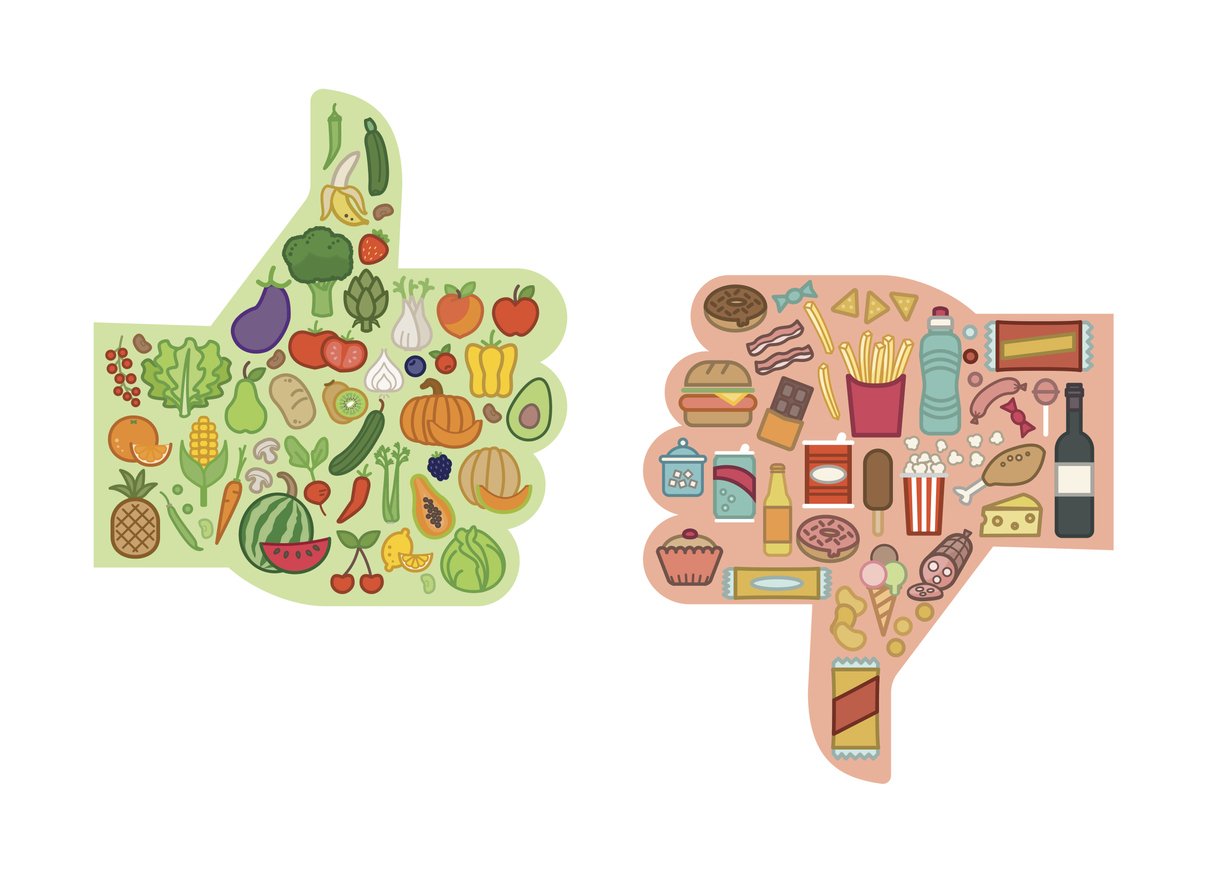
Plainly speaking, avoiding foods that may contribute to brain fog and choosing foods that prevent it provide us with tangible means of optimizing our personal and professional performance. Using foundational principles of nutritional psychiatry, when we tap into our body’s own intelligence and mindfully add foods to our plate which truly nourish the brain, we unlock the potential to be our best selves — with every bite we take.
Worst Foods for Brain Fog
Here are some of the ways diet can contribute to brain fog, as well as some tips on how you can optimize with better choices.
- Too many simple, refined, and processed carbs: Foods like pastries, cookies, crackers, and white bread/grains can throw your blood glucose out of whack. Instead, choose foods rich in fiber to reduce sugar cravings, and opt for low-glycemic fruits like berries.
- Too much caffeine: This is especially true if consumed in combination with refined sugars, flavorings, and processed creams. Focus on tapping into your body intelligence to choose foods that bring you sustained energy.
- Alcohol, especially in excess: While low to moderate alcohol consumption may be fine in some cases, it is best to examine this choice on an individual basis — perhaps with the help of a doctor or mental health professional. If you notice that you crave alcohol, or ever drink more than you intended, it might be time to reconsider your relationship with drinking. You probably know this already, but it bears repeating: excessive alcohol consumption is literally poison for your brain.
- Foods that trigger unknown allergies: If you have chronic fatigue, joint aches, muscle pains, headaches, memory problems, or other persistent brain fog symptoms, this is something that certainly warrants a thorough medical evaluation and your doctor may need to check some blood work.
- Foods that trigger undiagnosed digestive troubles, including SIBO, ulcerative colitis, or Crohn’s disease: Common trigger foods for digestive issues include dairy, fried or processed foods, sugar, refined grains (especially ultra-processed wheat), carbonated sodas, caffeine, and alcohol. Large meals can also disrupt your gut-brain balance — it’s best to listen to your body’s needs and eat in a way that leaves you feeling nourished and not sluggish.
Top 5 Food Tips For Getting Rid of Brain Fog
On the other hand, nutritional psychiatry teaches us that we can take advantage of the properties of brain foods to boost our energy and clarity. The following pearls of advice are my fundamentals when it comes to optimizing cognition.
1. Beat brain fog with colorful fruits and veggies.
Fiber-rich, plant-based foods are packed with antioxidants, polyphenols, flavanols, vitamins, and minerals that help reduce inflammation in the brain and resist the effects of oxidative stress (the kind that damages cells, and even leads to premature aging). These superfoods can help improve focus, reduce fatigue, and enhance cognition for optimal performance.
I encourage you to try this out as a game with your family and friends: see how many new colors you can add in a day or a week to enhance the biodiversity in your diet. And another plus — eating the rainbow has also been linked to improved gut health!
2. Cook with herbs and spices.
Cooking with herbs and spices adds a delicious punch of brain-boosting molecules to food! For example, turmeric has an active ingredient called curcumin which has potent anti-inflammatory and antioxidant properties supporting positive moods and sharper focus. When you add turmeric with a pinch of black pepper to your cooking, the black pepper enhances curcumin absorption twentyfold. It’s also easy to add a teaspoon (with a pinch of black pepper!) to a warm tea, nourishing soup, or fresh smoothie.
For an antioxidant treat, check out my mood-boosting golden milk recipe:
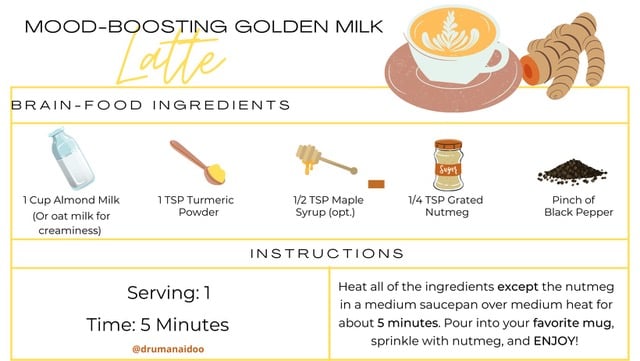
3. Follow your body intelligence surrounding caffeine and alcohol.
Many of us “power up” in the morning and throughout the day with the help of caffeine, and then wind down in the evening with wine or cocktails. While both of these substances may have some health benefits when consumed in moderation, their effects are also highly specific to each individual and their microbiome. This is where I suggest tapping into your body intelligence, one of the pillars of nutritional psychiatry.
Pay close attention to whether caffeine helps you improve focus, or is actually overstimulating and causes uncomfortable jitteriness. Similarly, it’s important to gently recognize if, after a wine or cocktail, you toss and turn at night and wake up feeling poorly rested. This awareness can guide you to potentially adjust your consumption — I believe in balance! — to resist any negative impact on mental health and work productivity.
4. Stay hydrated for brain health.
Remaining properly hydrated is key for optimal brain health and function! Many symptoms of poor mental health and cognitive function are tied to dehydration. Dehydration can worsen or even precipitate anxiety, while conversely, staying hydrated is associated with decreased depression and anxiety.
Sipping on water throughout the day and including hydrating fruits and vegetables in the diet, such as cucumber and leafy greens, help maintain a steady supply of water within the body. Keep a stainless steel or glass water bottle on your work desk and remember to refill it a few times every day, or set a reminder on your phone to keep sipping!
5. Snack on nutrient-dense brain foods.
When hunger pangs strike between meals, or when you’re in need of a “pick-me-up,” opt for brain foods that help keep your cognition tip-top and sharp. Due to the location in the brain, hunger and thirst signals are sometimes confused, so try sipping on some hydrating water to overcome hunger pangs until you can reach out for a healthy, brain-food-filled snack.
Some of my favorite focus-enhancing snacks are a small square of extra dark (80%+) natural chocolate, a handful of walnuts, or a dish of berries, all of which contain fiber, antioxidants, vitamins, and minerals that enhance our brainpower.
Or you can combine all of these foods into one superfood snack like this creamy and dairy-free chocolate mousse:
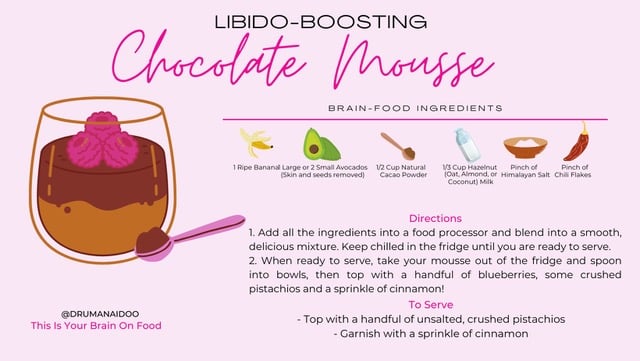
Foods for Brain Fog: Brain Health Recipes from FRN
When creating a brain-loving, plant-based meal, think lots of colors, a variety of textures, and a little bit of creaminess. That’s what you’ll get with the Food Revolution Network brain health recipes below.
The creamy and colorful base of the Berry Delicious Omega-3 Smoothie Bowl with the crunchy toppings is not only fun to eat and scrumptious to taste, but it also contains lots of ingredients that help the brain thrive. The Avocado Salad is pretty enough to bring to a gathering with family and friends and tasty enough to devour by yourself — and it’s super nutritious to boot! Make the Kale Walnut Basil Pesto your go-to brain spread that is delicious on everything from wraps to tacos to grain bowls. And prepare FRN’s Trail Mix early in the week to snack on all week long whenever hunger calls. Finally, sip on the Mind Milk throughout the week, and let us know what your brain thinks about it!
1. Berry Delicious Omega-3 Smoothie Bowl
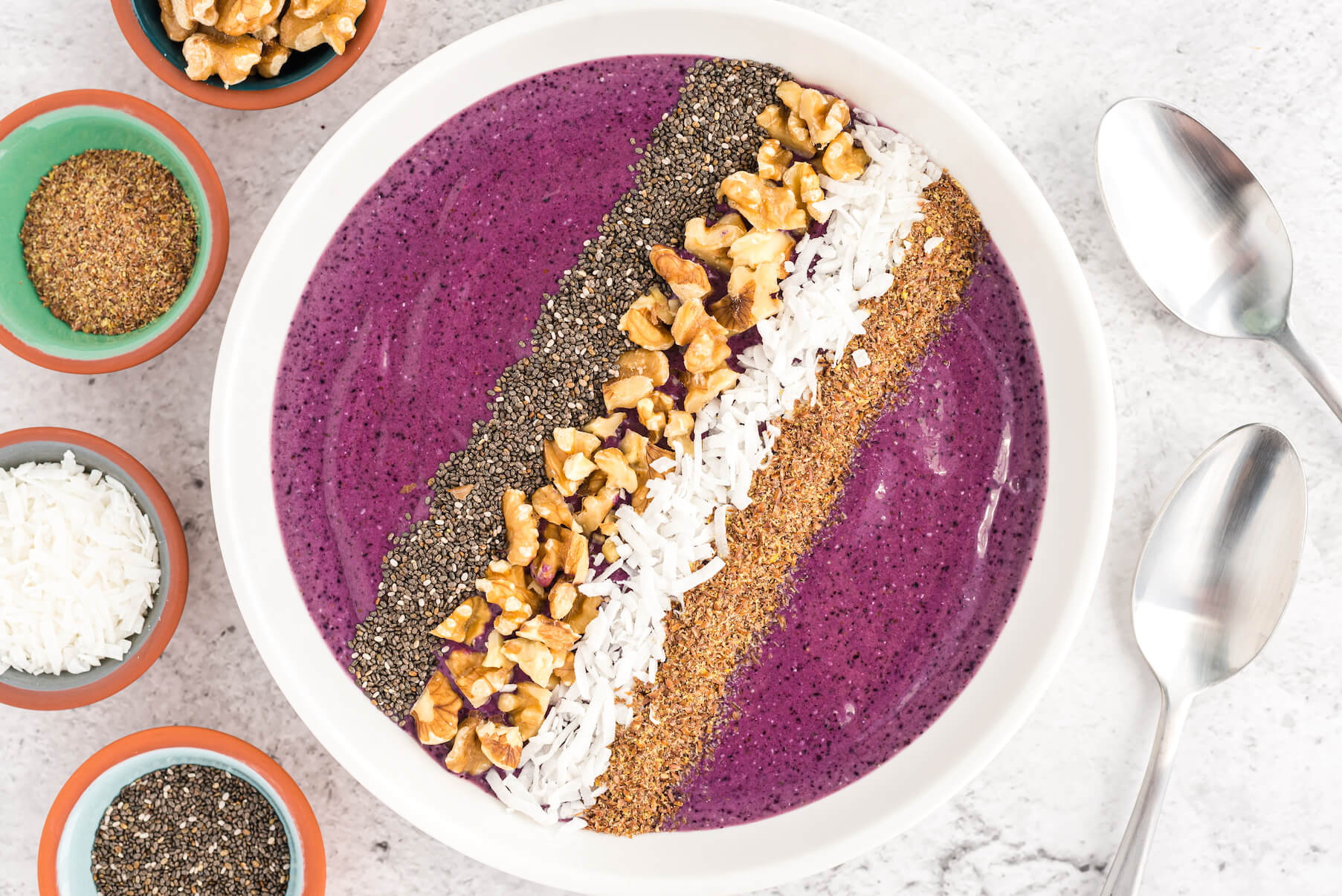
Boost your brainpower with a tasty bowl filled with a creamy blended delight of blueberries, strawberries, hemp seeds, and bananas. Berries contain antioxidants, hemp seeds have omega-3s, and bananas are filled with magnesium — all nutrients that the brain loves! Top the bowl with even more nutrient-dense goodness, like chia seeds, walnuts, and any other plant-based toppings that speak to you… and your brain!
2. Avocado Salad
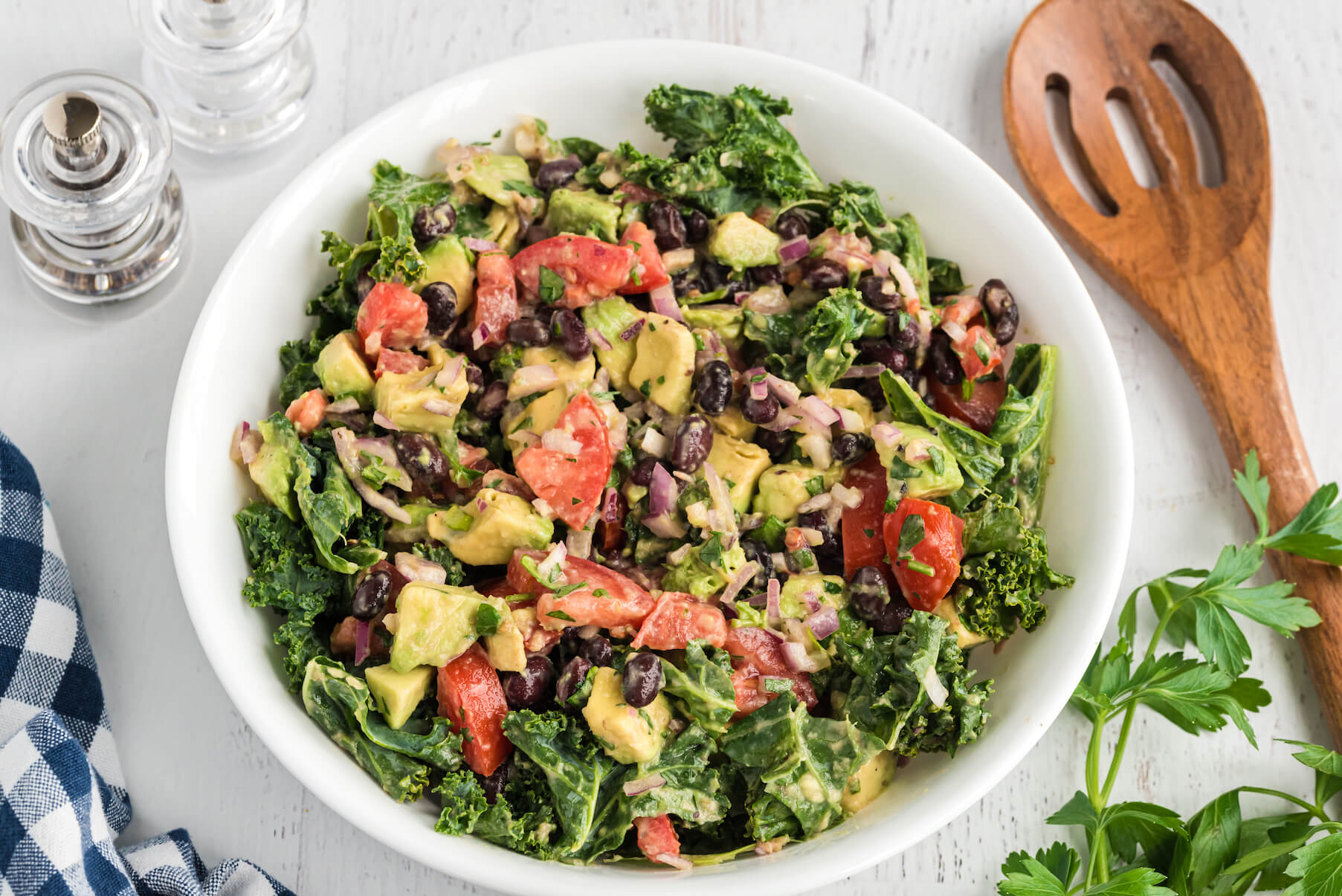
Think vibrant colors, whole (plant) foods, and flavorful spices whenever creating a brain-loving meal. Avocados take center stage with their healthy fats and abundant magnesium. They’re complemented in both flavor and nutrition through red onions, leafy greens, and black beans, all of which offer even more nutrition that supports a healthy brain and no brain fog. This scrumptious salad is one to add to your recipe library!
3. Kale Walnut Basil Pesto
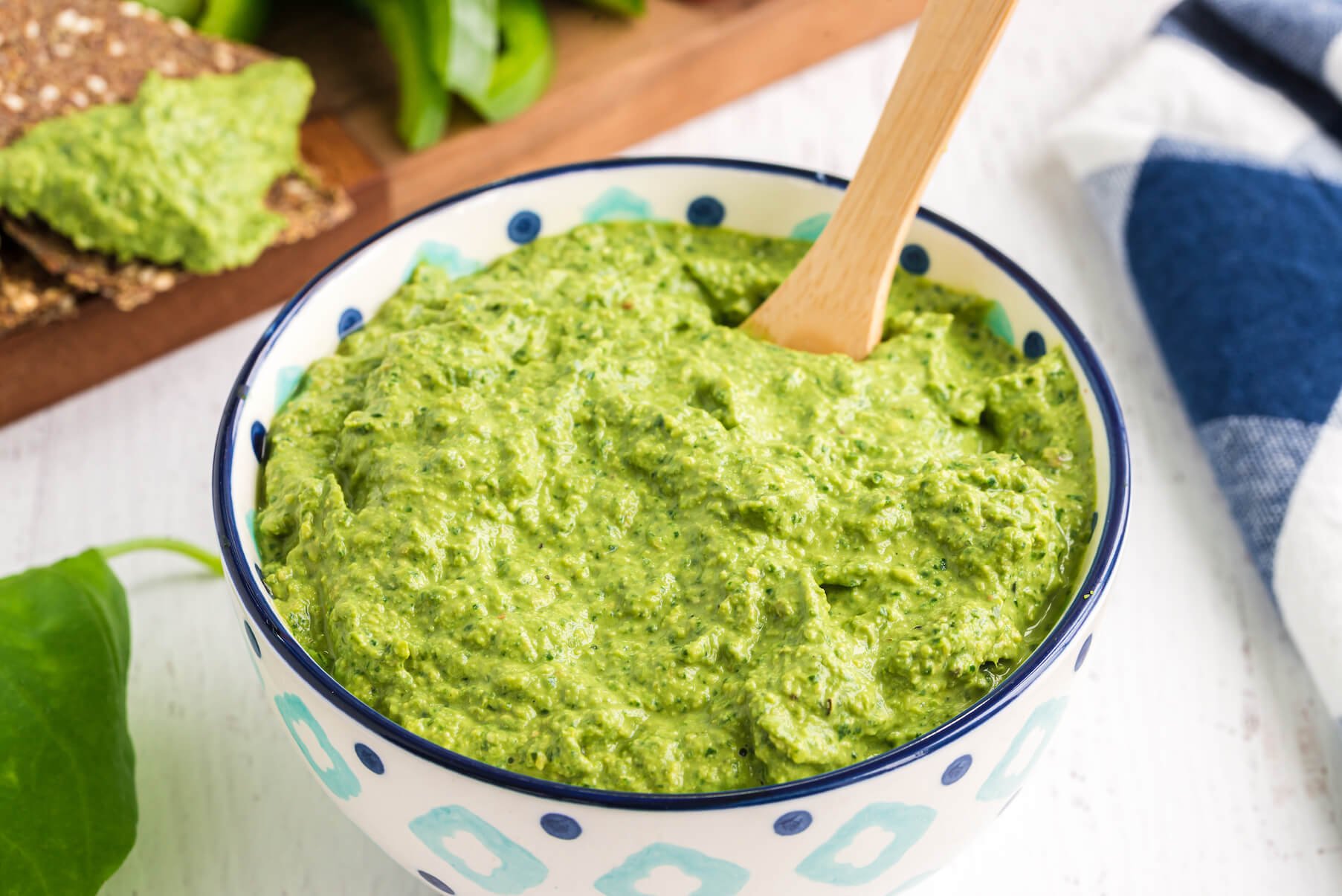
Walnuts, kale, and basil, oh my! Your brain is going to love this delicious, nutrient-powered spread that can be used as a dip for veggies, spread into collard leaves for wraps, or tossed in spiralized zucchini noodles — and that’s just the beginning! Leave a comment to let us know how you choose to use this Kale Walnut Basil Pesto.
4. FRN’s Trail Mix
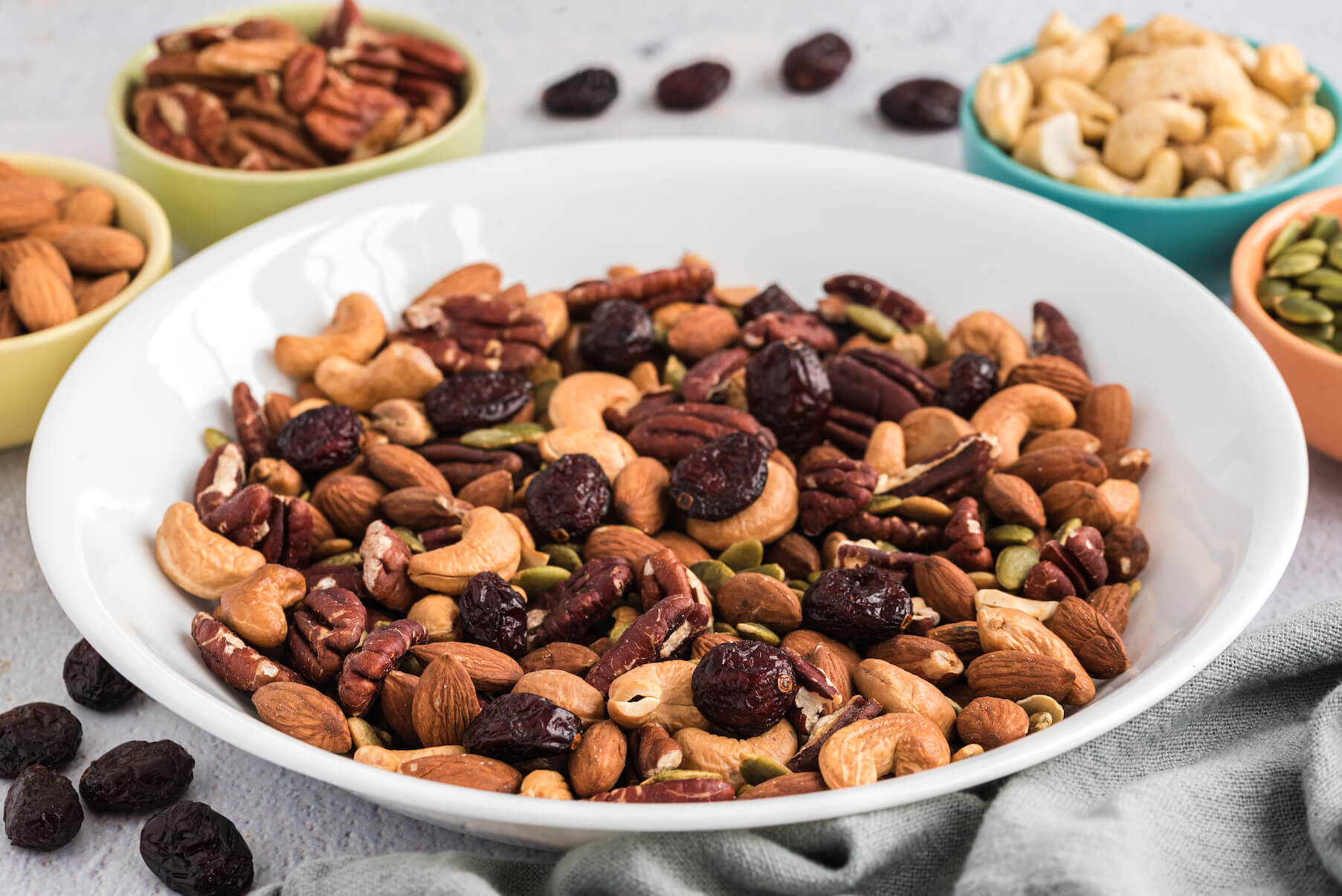
Smart snacking means keeping your blood sugar stable and hunger at bay until you’re ready for a full meal. Mindful nibbling on nuts and seeds can satisfy your crunch cravings, provide long-lasting energy, and feed your brain the nutrients it needs to thrive. Make a batch early in the week so you have it to munch on all week long!
5. Mind Milk

Any guesses as to what’s in this mind-supporting, brain-nourishing beverage? If you guessed turmeric, matcha green tea, and cinnamon, hooray! There’s also an optional bonus ingredient, Lion’s Mane mushrooms. If you choose to use it, you may notice even more focus, improved memory, and reduced inflammation. If you’re caffeine-sensitive, simply omit the matcha — this drink is still fabulous and nutritious without it.
Optimize to Get Rid of Brain Fog
Maximizing whole, nutrient-dense foods and decreasing ultra-processed food intake are vital elements of eating to boost cognitive clarity. And the benefits of consuming a variety of phytonutrient-rich fruits and veggies are boundless. Combining my five tips with Food Revolution Network’s recipes can be a powerful prescription for getting rid of brain fog.
Stillness in the Storm Editor: Why did we post this?
The news is important to all people because it is where we come to know new things about the world, which leads to the development of more life goals that lead to life wisdom. The news also serves as a social connection tool, as we tend to relate to those who know about and believe the things we do. With the power of an open truth-seeking mind in hand, the individual can grow wise and the collective can prosper.
– Justin
Not sure how to make sense of this? Want to learn how to discern like a pro? Read this essential guide to discernment, analysis of claims, and understanding the truth in a world of deception: 4 Key Steps of Discernment – Advanced Truth-Seeking Tools.
Stillness in the Storm Editor’s note: Did you find a spelling error or grammatical mistake? Send an email to [email protected], with the error and suggested correction, along with the headline and url. Do you think this article needs an update? Or do you just have some feedback? Send us an email at [email protected]. Thank you for reading.
Source:
https://foodrevolution.org/blog/how-to-get-rid-of-brain-fog-symptoms/
Support our work! (Avoid Big Tech PayPal and Patreon)DIRECT DONATION


Leave a Reply